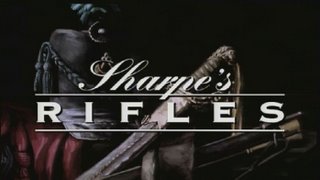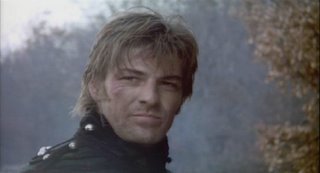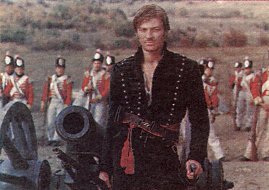
We recently signed up to stream Britbox and, oh, happy days! One of the offerings is the BBC’s Sharpe Series. I haven’t watched Sharpe in years and I’ve been having a great time binging on some young Sean Bean and the Napoleonic War. What could be better?
I dished on the Sharpe series in an old Risky Regency blog and my thoughts are pretty much the same then as now. Here they are, edited for now.

Richard Sharpe, for those of you who may not know, is a fictional soldier in the Napoleonic War, created by Bernard Cornwell in a wonderful series of books, adding new stories beyond those depicted in the tv series. Sharpe is a marvelous character and Cornwell does a masterful job of giving us such rich detail about the war and the time period, so that you actually feel as if you are there, experiencing it with Sharpe.
The BBC series Sharpe is played by Sean Bean, a very sigh-worthy choice.
Here is what Sean Bean’s Sharpe website said about the BBC series at the time of my original blog in 2006:
“The films are based on the Napoleonic campaign novels, and follow Sharpe and his “Chosen Men” (riflemen who are trusted crack shots). Sharpe has been promoted from the ranks, very unusual in its day, so he has the resentment of the “gentlemen” officers, and also that of the men, who assume he is no better than them. He is promoted after saving Wellington’s life, and is often sent on dangerous missions, along with the Chosen Men, due to his skills and bravery.
In the first film, Sharpe’s Rifles, we are introduced to the Riflemen who will become the Chosen Men, and Sharpe has to forge both respect and friendship with their soon-to-be Sergeant, Patrick Harper. The later films show how cohesive a fighting force these few men become, they think and act as one. The last film to be made was Sharpe’s Waterloo, depicting the great battle.”
I was first introduced to Sharpe years ago through the Chivers Audiobook versions. William Gaminara narrated, and his deep, sexy voice truly enhanced the experience. I can still hear him say, “Sharpe swore.” Unfortunately, I no longer can find those versions. I recently started listening to another audiobook version of Sharpe’s Waterloo read by a different narrator. Not quite the same, but good enough.

Sean Bean is also not the Sharpe I visualized while listening to those audiobooks years ago. In fact, almost all the cast of the BBC version are not the people Cornwell gave to my imagination. Furthermore, I think of the BBC shows as “Sharpe Lite.” The shows meld elements of several of the books into one story, but cannot give the richness of detail that is in the books. Another point–these were not high budget productions, so rather than a cast of thousands, you get a cast of….dozens.
Cornwell also is no romance novelist. His Sharpe is actually quite stupid in love, which is quite frustrating, but even unsatisfying romance elements were not enough to keep me from loving the books, the character, the life of the Napoleonic soldier.
And the Sharpe films, for all that they are not being the Sharpe of my imagination, are still wonderful. If you don’t get Britbox, you can also buy the Sharpe films from Amazon and, I presume, other outlets.
Enjoy!
Diane

The fascinating bit that Bean wasn’t the original choice for Sharpe always wondered what the Alternative Universe version of it would have been like, with their first choice for the role, Paul McGann… (8th Doctor).
There’s a few images floating around of him in costume before he tore his knee up and had to bow out…
Paul McGann is a bit closer to the Sharpe that Cornwell described. But I also heard that Cornwell altered his descriptions in later books to look more like Sean Bean. I’m afraid Bean is now fixed in everyone’s mind as Sharpe!
The description of Sharpe in the early books is with dark hair with a badger stripe of white — very definitely not the blonde Sean Bean. But Bean had the accent and manners of someone born into a rough world who fought his way up, and in that he was the perfect Sharpe. Bean also has an interesting face, one that in some lights and some angles is almost ugly but in others is breathtakingly attractive, so far more fascinating than a more conventionally handsome face could be.
I do agree with that, Susan!